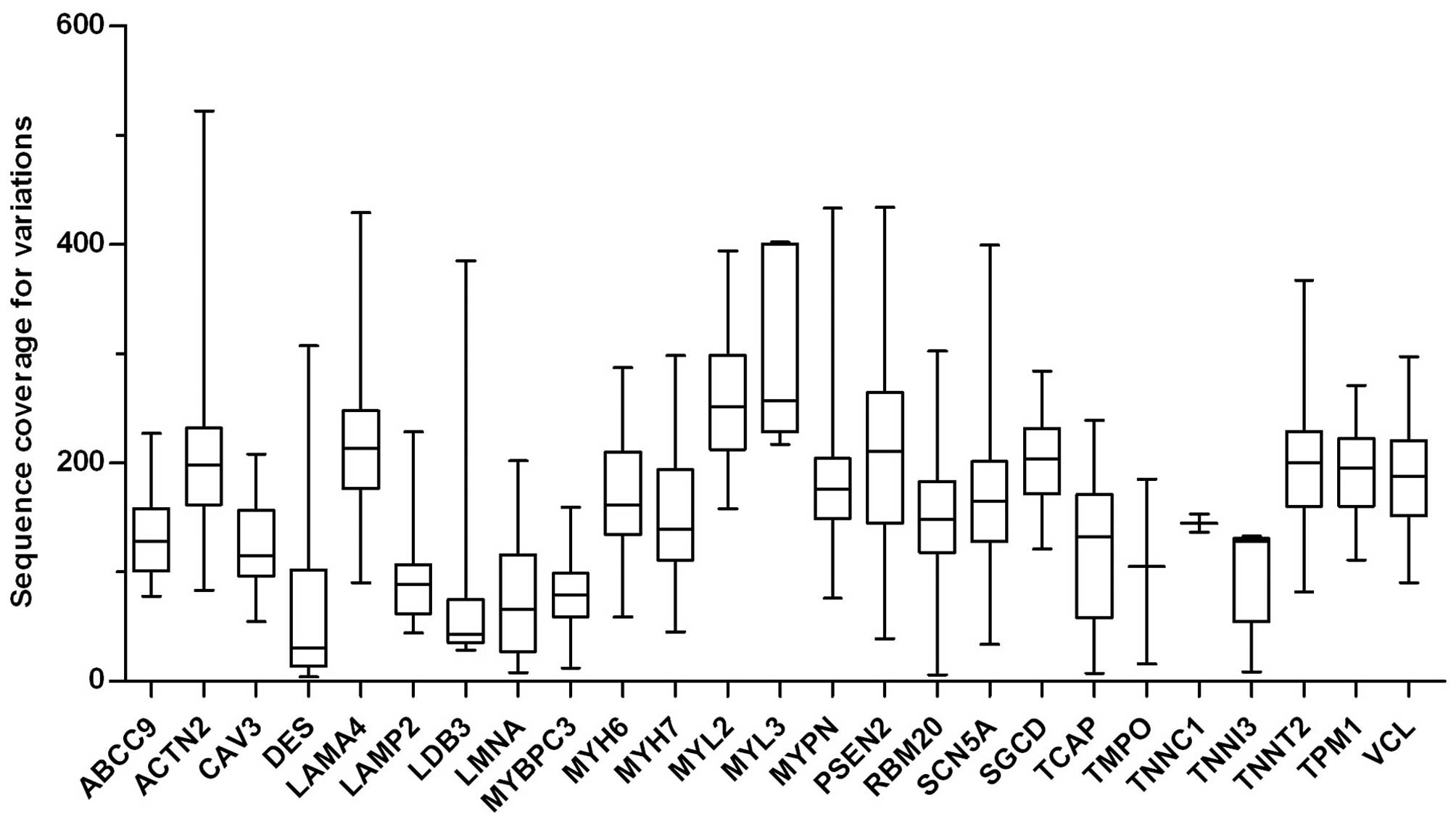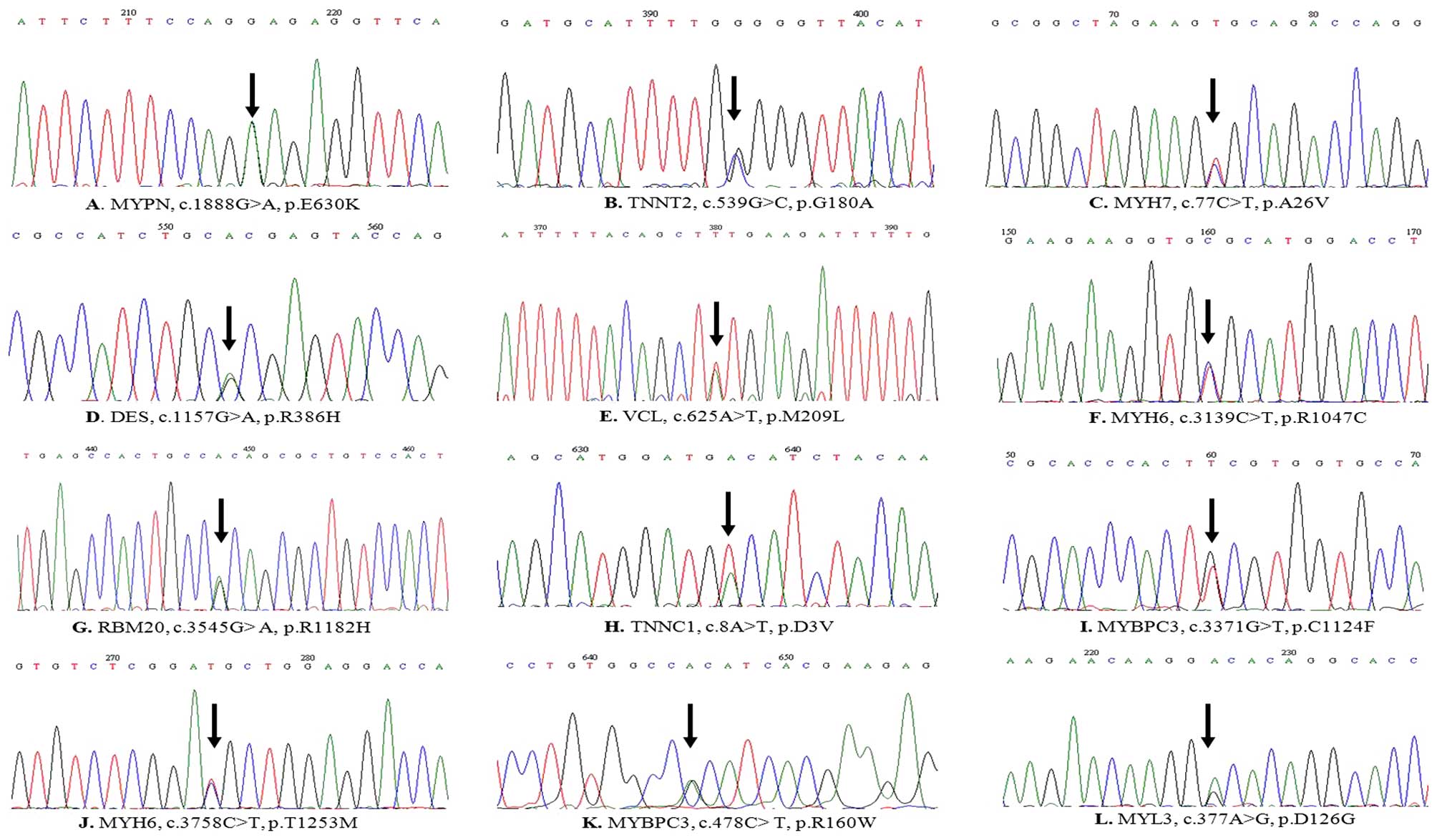|
1
|
Taylor MR, Carniel E and Mestroni L:
Cardiomyopathy, familial dilated. Orphanet J Rare Dis. 1:272006.
View Article : Google Scholar : PubMed/NCBI
|
|
2
|
Hershberger RE and Siegfried JD: Update
2011: clinical and genetic issues in familial dilated
cardiomyopathy. J Am Coll Cardiol. 57:1641–1649. 2011. View Article : Google Scholar : PubMed/NCBI
|
|
3
|
Michels VV, Moll PP, Miller FA, Tajik AJ,
Chu JS, Driscoll DJ, Burnett JC, Rodeheffer RJ, Chesebro JH and
Tazelaar HD: The frequency of familial dilated cardiomyopathy in a
series of patients with idiopathic dilated cardiomyopathy. N Engl J
Med. 326:77–82. 1992. View Article : Google Scholar : PubMed/NCBI
|
|
4
|
Hershberger RE, Hedges DJ and Morales A:
Dilated cardiomyopathy: the complexity of a diverse genetic
architecture. Nat Rev Cardiol. 10:531–547. 2013. View Article : Google Scholar : PubMed/NCBI
|
|
5
|
Zhao L, Xu JH, Xu WJ, Yu H, Wang Q, Zheng
HZ, Jiang WF, Jiang JF and Yang YQ: A novel GATA4 loss-of-function
mutation responsible for familial dilated cardiomyopathy. Int J Mol
Med. 33:654–660. 2014.
|
|
6
|
Zhou W, Zhao L, Jiang JQ, Jiang WF, Yang
YQ and Qiu XB: A novel TBX5 loss-of-function mutation associated
with sporadic dilated cardiomyopathy. Int J Mol Med. 36:282–288.
2015.PubMed/NCBI
|
|
7
|
Xu L, Zhao L, Yuan F, Jiang WF, Liu H, Li
RG, Xu YJ, Zhang M, Fang WY, Qu XK, et al: GATA6 loss-of-function
mutations contribute to familial dilated cardiomyopathy. Int J Mol
Med. 34:1315–1322. 2014.PubMed/NCBI
|
|
8
|
Zhang XL, Dai N, Tang K, Chen YQ, Chen W,
Wang J, Zhao CM, Yuan F, Qiu XB, Qu XK, et al: GATA5
loss-of-function mutation in familial dilated cardiomyopathy. Int J
Mol Med. 35:763–770. 2015.
|
|
9
|
Yuan F, Qiu XB, Li RG, Qu XK, Wang J, Xu
YJ, Liu X, Fang WY, Yang YQ and Liao DN: A novel NKX2-5
loss-of-function mutation predisposes to familial dilated
cardiomyopathy and arrhythmias. Int J Mol Med. 35:478–486.
2015.
|
|
10
|
Hershberger RE, Morales A and Siegfried
JD: Clinical and genetic issues in dilated cardiomyopathy: a review
for genetics professionals. Genet Med. 12:655–667. 2010. View Article : Google Scholar : PubMed/NCBI
|
|
11
|
Murphy RT, Mogensen J, Shaw A, Kubo T,
Hughes S and McKenna WJ: Novel mutation in cardiac troponin I in
recessive idiopathic dilated cardiomyopathy. Lancet. 363:371–372.
2004. View Article : Google Scholar : PubMed/NCBI
|
|
12
|
Roh JI, Cheong C, Sung YH, Lee J, Oh J,
Lee BS, Lee JE, Gho YS, Kim DK, Park CB, et al: Perturbation of
NCOA6 leads to dilated cardiomyopathy. Cell Rep. 8:991–998. 2014.
View Article : Google Scholar : PubMed/NCBI
|
|
13
|
Man E, Lafferty KA, Funke BH, Lun KS, Chan
SY, Chau AK and Chung BH: NGS identifies TAZ mutation in a family
with X-linked dilated cardiomyopathy. BMJ Case Rep. 2013:pii:
bcr2012007529. 2013.
|
|
14
|
Charron P, Arad M, Arbustini E, Basso C,
Bilinska Z, Elliott P, Helio T, Keren A, McKenna WJ, Monserrat L,
et al: European Society of Cardiology Working Group on Myocardial
and Pericardial Diseases: Genetic counselling and testing in
cardiomyopathies: a position statement of the European Society of
Cardiology Working Group on Myocardial and Pericardial Diseases.
Eur Heart J. 31:2715–2726. 2010. View Article : Google Scholar : PubMed/NCBI
|
|
15
|
Posafalvi A, Herkert JC, Sinke RJ, van den
Berg MP, Mogensen J, Jongbloed JD and van Tintelen JP: Clinical
utility gene card for: dilated cardiomyopathy (CMD). Eur J Hum
Genet. 21:212013. View Article : Google Scholar
|
|
16
|
Mardis ER: Next-generation DNA sequencing
methods. Annu Rev Genomics Hum Genet. 9:387–402. 2008. View Article : Google Scholar : PubMed/NCBI
|
|
17
|
Schuster SC: Next-generation sequencing
transforms today's biology. Nat Methods. 5:16–18. 2008. View Article : Google Scholar : PubMed/NCBI
|
|
18
|
Ware SM: Genetic diagnosis in pediatric
cardiomyopathy: clinical application and research perspectives.
Prog Pediatr Cardiol. 31:99–102. 2011. View Article : Google Scholar : PubMed/NCBI
|
|
19
|
Biswas A, Rao VR, Seth S and Maulik SK:
Next generation sequencing in cardiomyopathy: towards personalized
genomics and medicine. Mol Biol Rep. 41:4881–4888. 2014. View Article : Google Scholar : PubMed/NCBI
|
|
20
|
Punetha J and Hoffman EP: Short read
(next-generation) sequencing: a tutorial with cardiomyopathy
diagnostics as an exemplar. Circ Cardiovasc Genet. 6:427–434. 2013.
View Article : Google Scholar : PubMed/NCBI
|
|
21
|
Mestroni L, Maisch B, McKenna WJ, Schwartz
K, Charron P, Rocco C, Tesson F, Richter A, Wilke A and Komajda M:
Guidelines for the study of familial dilated cardiomyopathies.
Collaborative Research Group of the European Human and Capital
Mobility Project on Familial Dilated Cardiomyopathy. Eur Heart J.
20:93–102. 1999. View Article : Google Scholar : PubMed/NCBI
|
|
22
|
Li H and Durbin R: Fast and accurate
long-read alignment with Burrows-Wheeler transform. Bioinformatics.
26:589–595. 2010. View Article : Google Scholar : PubMed/NCBI
|
|
23
|
Li H, Handsaker B, Wysoker A, Fennell T,
Ruan J, Homer N, Marth G, Abecasis G and Durbin R: 1000 Genome
Project Data Processing Subgroup: The Sequence Alignment/Map format
and SAMtools. Bioinformatics. 25:2078–2079. 2009. View Article : Google Scholar : PubMed/NCBI
|
|
24
|
Koboldt DC, Zhang Q, Larson DE, Shen D,
McLellan MD, Lin L, Miller CA, Mardis ER, Ding L and Wilson RK:
VarScan 2: Somatic mutation and copy number alteration discovery in
cancer by exome sequencing. Genome Res. 22:568–576. 2012.
View Article : Google Scholar : PubMed/NCBI
|
|
25
|
Wang K, Li M and Hakonarson H: ANNOVAR:
functional annotation of genetic variants from high-throughput
sequencing data. Nucleic Acids Res. 38:e1642010. View Article : Google Scholar : PubMed/NCBI
|
|
26
|
Tester DJ and Ackerman MJ: Genetic testing
for potentially lethal, highly treatable inherited
cardiomyopathies/channelopathies in clinical practice. Circulation.
123:1021–1037. 2011. View Article : Google Scholar : PubMed/NCBI
|
|
27
|
Maron BJ and Semsarian C: Prevention of
sudden death for patients with cardiomyopathies another step
forward. J Am Coll Cardiol. 59:501–502. 2012. View Article : Google Scholar : PubMed/NCBI
|
|
28
|
Chiu C, Tebo M, Ingles J, Yeates L, Arthur
JW, Lind JM and Semsarian C: Genetic screening of calcium
regulation genes in familial hypertrophic cardiomyopathy. J Mol
Cell Cardiol. 43:337–343. 2007. View Article : Google Scholar : PubMed/NCBI
|
|
29
|
Richards CS, Bale S, Bellissimo DB, Das S,
Grody WW, Hegde MR and Lyon E: ACMG recommendations for standards
for interpretation and reporting of sequence variations: Revisions
2007. Genet Med. 10:294–300. 2008. View Article : Google Scholar : PubMed/NCBI
|
|
30
|
Kumar P, Henikoff S and Ng PC: Predicting
the effects of coding non-synonymous variants on protein function
using the SIFT algorithm. Nat Protoc. 4:1073–1081. 2009. View Article : Google Scholar : PubMed/NCBI
|
|
31
|
Schwarz JM, Rödelsperger C, Schuelke M and
Seelow D: MutationTaster evaluates disease-causing potential of
sequence alterations. Nat Methods. 7:575–576. 2010. View Article : Google Scholar : PubMed/NCBI
|
|
32
|
Adzhubei IA, Schmidt S, Peshkin L,
Ramensky VE, Gerasimova A, Bork P, Kondrashov AS and Sunyaev SR: A
method and server for predicting damaging missense mutations. Nat
Methods. 7:248–249. 2010. View Article : Google Scholar : PubMed/NCBI
|
|
33
|
Wang S, Zou Y, Fu C, Xu X, Wang J, Song L,
Wang H, Chen J, Wang J, Huan T and Hui R: Worse prognosis with gene
mutations of beta-myosin heavy chain than myosin-binding protein C
in Chinese patients with hypertrophic cardiomyopathy. Clin Cardiol.
31:114–118. 2008. View Article : Google Scholar : PubMed/NCBI
|
|
34
|
Robinson P, Griffiths PJ, Watkins H and
Redwood CS: Dilated and hypertrophic cardiomyopathy mutations in
troponin and alpha-tropomyosin have opposing effects on the calcium
affinity of cardiac thin filaments. Circ Res. 101:1266–1273. 2007.
View Article : Google Scholar : PubMed/NCBI
|
|
35
|
Mirza M, Marston S, Willott R, Ashley C,
Mogensen J, McKenna W, Robinson P, Redwood C and Watkins H: Dilated
cardiomyopathy mutations in three thin filament regulatory proteins
result in a common functional phenotype. J Biol Chem.
280:28498–28506. 2005. View Article : Google Scholar : PubMed/NCBI
|
|
36
|
Mller DV, Andersen PS, Hedley P, Ersbll
MK, Bundgaard H, Moolman-Smook J, Christiansen M and Kber L: The
role of sarcomere gene mutations in patients with idiopathic
dilated cardiomyopathy. Eur J Hum Genet. 17:1241–1249. 2009.
View Article : Google Scholar
|
|
37
|
Hershberger RE, Norton N, Morales A, Li D,
Siegfried JD and Gonzalez-Quintana J: Coding sequence rare variants
identified in MYBPC3, MYH6, TPM1, TNNC1, and TNNI3 from 312
patients with familial or idiopathic dilated cardiomyopathy. Circ
Cardiovasc Genet. 3:155–161. 2010. View Article : Google Scholar : PubMed/NCBI
|
|
38
|
Hershberger RE, Parks SB, Kushner JD, Li
D, Ludwigsen S, Jakobs P, Nauman D, Burgess D, Partain J and Litt
M: Coding sequence mutations identified in MYH7, TNNT2, SCN5A,
CSRP3, LBD3, and TCAP from 313 patients with familial or idiopathic
dilated cardiomyopathy. Clin Transl Sci. 1:21–26. 2008. View Article : Google Scholar
|
|
39
|
Lakdawala NK, Funke BH, Baxter S, Cirino
AL, Roberts AE, Judge DP, Johnson N, Mendelsohn NJ, Morel C, Care
M, et al: Genetic testing for dilated cardiomyopathy in clinical
practice. J Card Fail. 18:296–303. 2012. View Article : Google Scholar : PubMed/NCBI
|
|
40
|
Liu W, Liu W, Hu D, Zhu T, Ma Z, Yang J,
Xie W, Li C, Li L, Yang J, et al: Mutation spectrum in a large
cohort of unrelated Chinese patients with hypertrophic
cardiomyopathy. Am J Cardiol. 112:585–589. 2013. View Article : Google Scholar : PubMed/NCBI
|
|
41
|
Matsushita Y, Furukawa T, Kasanuki H,
Nishibatake M, Kurihara Y, Ikeda A, Kamatani N, Takeshima H and
Matsuoka R: Mutation of junctophilin type 2 associated with
hypertrophic cardiomyopathy. J Hum Genet. 52:543–548. 2007.
View Article : Google Scholar : PubMed/NCBI
|
|
42
|
Zou Y, Wang J, Liu X, Wang Y, Chen Y, Sun
K, Gao S, Zhang C, Wang Z, Zhang Y, et al: Multiple gene mutations,
not the type of mutation, are the modifier of left ventricle
hypertrophy in patients with hypertrophic cardiomyopathy. Mol Biol
Rep. 40:3969–3976. 2013. View Article : Google Scholar : PubMed/NCBI
|
|
43
|
Wang J, Xu SJ, Zhou H, Wang LJ, Hu B, Fang
F, Zhang XM, Luo YW, He XY, Zhuang SW, et al: A novel mutation of
the beta myosin heavy chain gene responsible for familial
hypertrophic cardiomyopathy. Clin Cardiol. 32:E16–E21. 2009.
View Article : Google Scholar : PubMed/NCBI
|
|
44
|
Carniel E, Taylor MR, Sinagra G, Di
Lenarda A, Ku L, Fain PR, Boucek MM, Cavanaugh J, Miocic S, Slavov
D, et al: Alpha-myosin heavy chain: a sarcomeric gene associated
with dilated and hypertrophic phenotypes of cardiomyopathy.
Circulation. 112:54–59. 2005. View Article : Google Scholar : PubMed/NCBI
|
|
45
|
Herman DS, Hovingh GK, Iartchouk O, Rehm
HL, Kucherlapati R, Seidman JG and Seidman CE: Filter-based
hybridization capture of subgenomes enables resequencing and
copy-number detection. Nat Methods. 6:507–510. 2009. View Article : Google Scholar : PubMed/NCBI
|
|
46
|
Sikkema-Raddatz B, Johansson LF, de Boer
EN, Almomani R, Boven LG, van den Berg MP, van Spaendonck-Zwarts
KY, van Tintelen JP, Sijmons RH, Jongbloed JD and Sinke RJ:
Targeted next-generation sequencing can replace Sanger sequencing
in clinical diagnostics. Hum Mutat. 34:1035–1042. 2013. View Article : Google Scholar : PubMed/NCBI
|
















